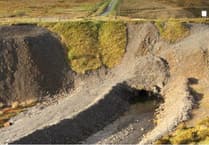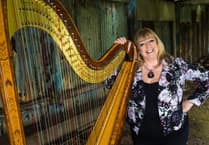CANDELAS frontman Osian Huw Williams has been on a journey to learn more about the last 60 years of Welsh music.
To learn more about the history of the guitar and how it’s changed and shaped Welsh music over the last 60 years, a new S4C show follows the personal journey of Osian Huw Williams, guitarist and main vocalist from Llanuwchllyn band, Candelas in Gitâr yn y To (Guitar in the roof) on S4C at 8pm on Saturday 30 April.
“It’s bonkers that you have a lump of wood with six strings, that’s all it is, it’s really changed the world and has influenced us in Wales,” says Osian.
Starting in the 60s, Osian travels through the decades and speaks to some of the main guitarists from the Welsh music scene. From Meic Stevens and Dafydd Iwan, to Heather Jones, Gwyneth Glyn, Owen Powell and Mei Gwynedd, we learn of the significance and the strong influence the guitar had in the development of Welsh music today.
And we’ll have a feast for the ears as the big names play some of the most famous riffs of the last 60 years.
Before the early 60s, the piano was the prominent instrument, especially in the Noson Lawen (traditional Welsh entertainment evenings) but with the influence of music from America and Ireland it became the guitar’s turn to step to the stage.
But where did all this start? At the centre of the change for Welsh music was the Urdd residential centre, Glan-llyn, with big names like Dewi Pws, Delwyn Siôn and Heather Jones playing and composing there - and the first place Dafydd Iwan performed publicly!
Looking back at the early days, Dafydd Iwan says: “There was something happening, there was something in the air in the 60s, it was like the young people were ready for change.”
And there was a change. By the end of the 60s there was a huge change in music by bands and artists with Heather Jones successfully bridging two genres – folk and rock.
“The guitar is a good friend to me,” says Heather Jones as she explains how she tried to change the attitudes of women in Wales about music, and she received an adverse reaction for doing so.
There was a shortage of women in the first 30 years, but Gwyneth Glyn, one of the most prominent women in Welsh music goes on to say that by today, women have “...found our way to the guitar in different ways”.
A name that’s mentioned more than once is the late Tich Gwilyn, “the wizard” as Peredur ap Gwynedd from the band Pendelum describes him “...one of the most excellent and talented...I can’t put my finger on it, he was just the best,” he says.
Osian reaches the end of his journey with the musician Yws Gwynedd, it becomes apparent that the guitar has played an integral part in the change in Welsh music since the 60’s.
“All of these big names are equally as important in my opinion,” says Osian Williams. “The past decade has influenced the next and has allowed bands/artists to create music from all genres in the Welsh language, and today isn’t an exception with more music than ever being made.”




